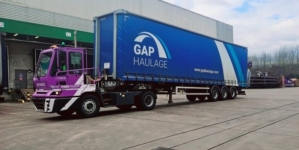-
QUECLINK LAUNCHES COMPACT DMS CAMERA SOLUTION FOR ADVANCED DRIVER MONITORING - 2 hours ago
-
CTRACK AND ARTURA JOIN FORCES TO LAUNCH TELEMATICS-ENABLED ACCIDENT AND REPAIR SOLUTION - April 28, 2025
-
GOPLASTICPALLETS.COM CELEBRATES MONUMENTAL 2,000 TONNE RECYCLING MILESTONE - April 24, 2025
-
LSA INTERNATIONAL CHOOSES PROLOG FULFILMENT TO MANAGE ITS DISTRIBUTION & LOGISTICS - April 23, 2025
-
Uniserve Partners with Logistics Reply to Deliver Transformation to Customers Supply Chains - April 23, 2025
-
Nutrivend selects Forterro’s Orderwise to support online expansion and streamline operations - April 11, 2025
-
ARROWXL LAUNCHES AMBITIOUS ZERO WASTE ROADMAP - April 8, 2025
-
THE BCMPA’S NEW CAMPAIGN DRIVES OUTSOURCING SUCCESS IN Q1 - April 7, 2025
-
BLACKOUT TECHNOLOGIES TARGETS TELEMATICS-INTEGRATED MOBILE DEVICE BLOCKING TO COMBAT SMARTPHONE DISTRACTION - April 1, 2025
-
OpenADR Alliance announces first OpenADR 3.0 certified products with EVoke Systems, E.ON Energy and Universal Devices - March 25, 2025
Transport operators register for success.
Photocaption: System Group’s Rachel Shorrock wants more to sign-up to the RoATP in an effort to further drive-up training standards in the transport and logistics sector.
WITH official figures showing that a little under half of the employers eligible to register on the government’s apprenticeship system had done so, Rachel Shorrock of System Group is urging more to sign-up in an effort to further drive-up standards of skills training in the transport and logistics sector.
It’s a little over six months since the government’s Register of Apprenticeship Training Providers (RoATP), which is managed by the Education and Skills Funding Agency (ESFA), opened in a move aimed at helping those in the transport and logistics sector, among other industries, select a training provider.
The register lists the firms that are approved to deliver apprenticeship training to employers using the online apprenticeship service, and includes those who were successful in making an application in October 2016 and at the second opening in March 2017.
The register sets-out a list of approved training organisations that are subject to the Apprenticeship Levy guidelines. These providers can be used to deliver apprenticeship programmes and it requires them to meet a broad range of standards in areas spanning quality, capability, compliance and financial health.
Due diligence checks on the organisation of potential training partners and their directors, which cover financial checks and an assessment of capabilities to deliver high-quality training, are a guiding tenet of a structured and organised scheme. For many, this will be a welcome catalyst in driving up quality standards in those industries that are perceived to have suffered for years from a poor reputation when it comes to investment in skills training and apprenticeships.
However, latest government statistics* suggest that less than half of eligible employers are still to register. A total of 8,200 accounts were registered by May 31, according to figures published for the first time by the Department for Education on July 6. But, figures published by the DfE last August estimated that 19,150 companies, which represent just 1.3% of all employers, would be eligible to pay the apprenticeship levy. This suggests as many as 11,000 large employers have yet to sign up with the online service that enables them to spend their levy funds.
If this is the case, the Department for Education has to be doing more to try to encourage additional employers to sign up. Levy payers have two years to spend their money and undoubtedly many will be considering what their mix of apprenticeship training should be, whether via recruitment or training up existing members of staff, and at what levels of engagement. Given this situation, the time might be right when we should be looking to encourage the DfE and other sector leaders to start to ramp up the work they do to support employers and get them into a position where they’re engaged, enthused and ready to use their funds to invest in quality training for apprentices.
But it shouldn’t just be left up to government and their agencies to act. We all have a responsibility and part to play if we are going to equip employers with the highly trained and job ready workforces they need to be competitive. There’s a job for providers to do as the government’s apprenticeships’ sales force to explain to a significant proportion of employers the benefits of using their levy funding. We also need to communicate the key message that Brexit – which is going to happen whether or not people voted for it – means investment in skills via apprenticeships, is going to be more important than ever.
Giving employers in transport and logistics sector the control over their apprenticeships needs and funding is an essential feature of government’s plan to create an adept and skilled nation, and the register means that only organisations that eschew the mediocre for quality can deliver apprenticeships. Furthermore, the register offers investment in a national infrastructure to give employers the confidence to do business with high-quality training providers, and, moreover, make sure that individuals can benefit from gold-standard routes as they climb the ladder of opportunity.
The RoATP provides levied organisations with a list of top quality training providers and gives employers a level of assurance that the organisations they are partnering with possess both the capacity and capability to deliver high quality, sustainable apprenticeship training – and that companies such as System Group, who are on the register, should be delighted to be recognised as one of a partner of choice.
The government’s commitment to creating three million more apprenticeships will be driven by the Levy, which will increase the scope of the training undertaken by employers. So, inclusion in the register underlines the quality of a provider’s apprenticeship programme and its ability to deliver training of the highest calibre to important sectors such as transport and logistics, which ensure the wheels of the economy keep turning.
It’s clear for transport employers if they’re looking to choose a training partner, checking the Register of Approved Training Providers (RoATP) must be the first step on the road to apprenticeship success. It also helps to identify specialists in your sector, who understand your apprenticeship needs.
After all, why would you want to engage a provider that doesn’t understand your business? It doesn’t make sense from whichever angle you look at it – but using the register at least offers a step in the right direction and a head start in the race to training success.
Rachel Shorrock is a director at System Group, which works with logistics and transport companies, military and government departments, local authorities, national corporations and small businesses as well as individuals and the self-employed. The company also offers a wide range of qualifications from management and leadership through driver licence acquisition through to outsourced learning and development Levy management solutions. More at www.system-group.com























